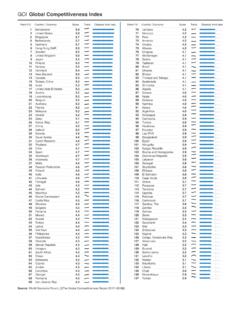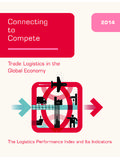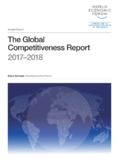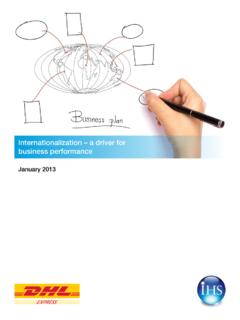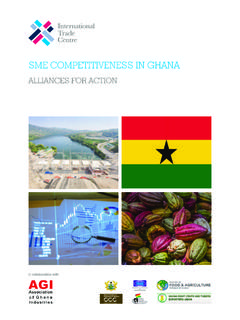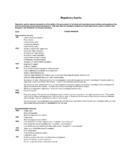Transcription of POWER LANGUAGE INDEX - Kai L. Chan
1 There are over 6,000 languages spoken in the world today, but some 2,000 of them count fewer than a thousand speakers. Moreover, just 15 of them account for half of the languages spoken in the are the world s most in uential languages? POWER LANGUAGE INDEXKai L. Chan, PhDWhich are the world s most in uential languages? What are the proper metrics to measure the reach and POWER of languages? POWER LANGUAGE INDEX (May 2016) Kai L. Chan, PhD Kai L. Chan, PhD Distinguished Fellow, INSEAD E: W: WEF Agenda: These are the most powerful languages in the world1 There are over 6,000 languages spoken in the world today, but some 2,000 of them count fewer than 1,000 speakers. Moreover, just 15 account for half of the languages spoken in the world. In a globalised world with multilingual societies, knowledge of languages is paramount in facilitating communication and in allowing people to participate in society s cultural, economic and social activities.
2 A pertinent question to ask then is: which are the most useful languages? If an alien were to land on Earth, which LANGUAGE would enable it to most fully engage with humans? To understand the efficacy of LANGUAGE (and by extension culture), consider the doors ( opportunities ) opened by it. Broadly speaking, there are five opportunities provided by LANGUAGE : 1. Geography: The ability to travel 2. Economy: The ability to participate in an economy 3. Communication: The ability to engage in dialogue 4. Knowledge and media: The ability to consume knowledge and media 5. Diplomacy: The ability to engage in international relations So which languages are the most powerful? Based on the opportunities above an INDEX can be constructed to compare/rank languages on their efficacy in the various domains. The POWER LANGUAGE INDEX (PLI) uses 20 indicators to measure the influence on LANGUAGE (see Table 1).
3 The INDEX measures the usefulness of a LANGUAGE to a representative human being and is not meant to apply to any particular person with their own set of conditions, preferences and geography. Neither is the INDEX a measure of the beauty/merit of a LANGUAGE or its associated culture(s). Table 1: Structure of POWER LANGUAGE INDEX COUNT GEOGRAPHY ( ) ECONOMY ( ) COMMUNICATION ( ) KNOWLEDGE & MEDIA ( ) DIPLOMACY ( ) 1 Countries spoken* GDP (PPP) Native speakers Internet content IMF 2 Land area GDP/capita (PPP)* L2 speakers* Feature films UN 3 Tourists (inbound)* Exports Family size* Top-500 universities WB 4 FX market* Tourists (outbound) Academic journals INDEX of 10 SNOs2 5 SDR composition* * Half weight within its opportunity; indicator weights are otherwise distributed evenly within each opportunity. ** Indicator variables that take on the value 1 if an official/working LANGUAGE of the institution and 0 otherwise.
4 A challenge in this exercise is that most often the data are linked with nation states, rather than the languages themselves. Moreover, multiple languages may be associated with a given country, and the different usages and statuses of languages may be complex. For example, a LANGUAGE may have official status in a country even if few people speak it. Other challenges include differentiating between a LANGUAGE and a dialect. Thus a coherent and robust way of mapping national indicators to the various languages associated with a country is required. 1 This is slightly modified version of a piece published in the WEF Agenda: 2 Supranational organisations ( BIE, FIFA, IOC, OECD, UPU, etc.). POWER LANGUAGE INDEX (May 2016) Kai L. Chan, PhD Kai L. Chan, PhD Distinguished Fellow, INSEAD E: W: Table 2 lists the 10 most powerful languages according to the PLI.
5 English is by far the most powerful LANGUAGE . It is the dominant LANGUAGE of three G7 nations (USA, UK and Canada), and British legacy has given it a global footprint. It is the world s lingua franca. Mandarin, which ranks second, is only half as potent. French comes in at third, thanks to its prestige standing in international diplomacy. Rounding out the top five are Spanish and Arabic. The top six languages even if the diplomacy opportunity is ignored also happen to be the official languages of the United Nations. The remaining four in the top 10 include the two other BRIC languages (Portuguese and Hindi), and the tongues of two economic heavyweights (Germany and Japan). Table 2: POWER LANGUAGE INDEX ranking (top 10) RANK SCORE LANGUAGE NATIVE (MM) GEOGRAPHY ECONOMY COMMUNI-CATION KNOWLEDGE & MEDIA DIPLOMACY 1 English 1 1 1 1 1 2 Mandarin* 6 2 2 3 6 3 French 2 6 5 5 1 4 Spanish 3 5 3 7 3 5 Arabic 4 9 6 18 4 6 Russian 5 12 10 9 5 7 German 8 3 7 4 8 8 Japanese 27 4 22 6 7 9 Portuguese 7 19 13 12 9 10 Hindi* 13 16 8 2 10 * If all Chinese dialects/languages (Mandarin being the largest) are considered as one it would not change the rank ordering.
6 However, if Urdu and Hindi and all the Hindi dialects are taken as one it would vault it past Portuguese and Japanese. Why LANGUAGE matters LANGUAGE is an essential component of competitiveness and the results above explain (in part) why London and New York are the world s two premier cities. 3 Likewise, Hong Kong and Singapore, with their English infrastructure, rather than monolingual Tokyo, are Asia s financial capitals. Indeed, it is no coincidence that eight of the top-10 global financial centres are English-speaking/proficient cities. 4 The strength of English has both positive and negative effects. Its status helps facilitate international communication in a globalised world. But conversely, Englishisation the creep of English into other languages and its displacement of rivals threatens the survival of lesser languages and the integrity of others. France, for instance, has taken steps to block the encroachment of English into French.
7 The figure below shows the relationship between LANGUAGE (PLI score) and competiveness, as measured by the WEF s Global competitiveness INDEX . 5 Four of the 10 most competitive economies have English as an official LANGUAGE . The remaining six have high shares of English speakers and/or a high proficiency in English, 6 with the exception of Japan. 3 Loughborough University: Globalisation and World Cities (2012). 4 Z/Yen Group: Global Financial Centres INDEX 20 (Sep 2016). 5 World Economic Forum: Global competitiveness Report 2016-17. 6 EF English Proficiency INDEX 2016. POWER LANGUAGE INDEX (May 2016) Kai L. Chan, PhD Kai L. Chan, PhD Distinguished Fellow, INSEAD E: W: Figure 1: Correlation between competitiveness and PLI Source: Author s calculations based on the Global competitiveness Report 2016 * Country PLI scores are calculated as weighted averages of the PLI scores according to the share of the population who speak its prevailing tongues.
8 The country score is also adjusted by the share of the population who speak English and their proficiency in it. LANGUAGE proficiency can also (partially) explain the composition of the global elite. Namely, the movers and shakers of the world tend to have an English-speaking bias. That is, countries with low English proficiency count fewer members of the global elite than expected relative to population, GDP or number of Thus global policy debates, which invariably are done in English, may neglect the concerns of English-weak nations. Sorry, Google translate will only get you so far Globalisation made English a worldwide phenomenon. But could technology ( real-time translation devices) obviate the need to learn languages and equalize the linguistic field? Translation technologies will indeed be a breakthrough, much the way that GPS maps have obviated road atlases. 7 Wai, Jonathan (2014).
9 Investigating the world s rich and powerful: Education cognitive ability, and sex differences. Intelligence 46 (2014) 54-72. POWER LANGUAGE INDEX (May 2016) Kai L. Chan, PhD Kai L. Chan, PhD Distinguished Fellow, INSEAD E: W: However, LANGUAGE is much more than just a collection of words. It is intertwined with culture and is an emotional aspect of human character. Moreover, studies have shown that multilinguals solve problems more Likewise, personality has been shown to change according to the LANGUAGE in which a person In short, translation devices will never fully replace the human voice and the benefits of learning languages. Just as Google has not made all humans researchers, neither will translation devices, per se, make us more empathetic or knowledgeable of other cultures. Although English is now the dominant LANGUAGE , might Mandarin (or another LANGUAGE ) one day challenge its supremacy?
10 This leads to another interesting question: which languages will be the most powerful in 2050? Table 3 is a forecast of the PLI based on the expected values of the 20 indicators that will prevail in Table 3: POWER LANGUAGE INDEX ranking (2050) RANK SCORE LANGUAGE NATIVE (MM) GEOGRAPHY ECONOMY COMMUNI-CATION KNOWLEDGE & MEDIA DIPLOMACY 1 English 1 1 2 1 1 2 Mandarin 6 2 1 2 6 3 Spanish 3 5 3 6 3 4 French 2 8 6 5 1 5 Arabic 4 7 4 18 4 6 Russian 5 10 10 8 5 7 German 10 3 9 4 7 8 Portuguese 7 9 8 12 9 9 Hindi 11 4 7 3 10 10 Japanese 30 6 17 7 8 Is it perhaps time to dig out those old Rosetta Stone tapes and get to learning another LANGUAGE ? 8 Keysar, Boaz, Sayuri L. Hayakawa & Sun Gyu An (2012): The foreign LANGUAGE effect: thinking in a foreign LANGUAGE reduces decision biases.
